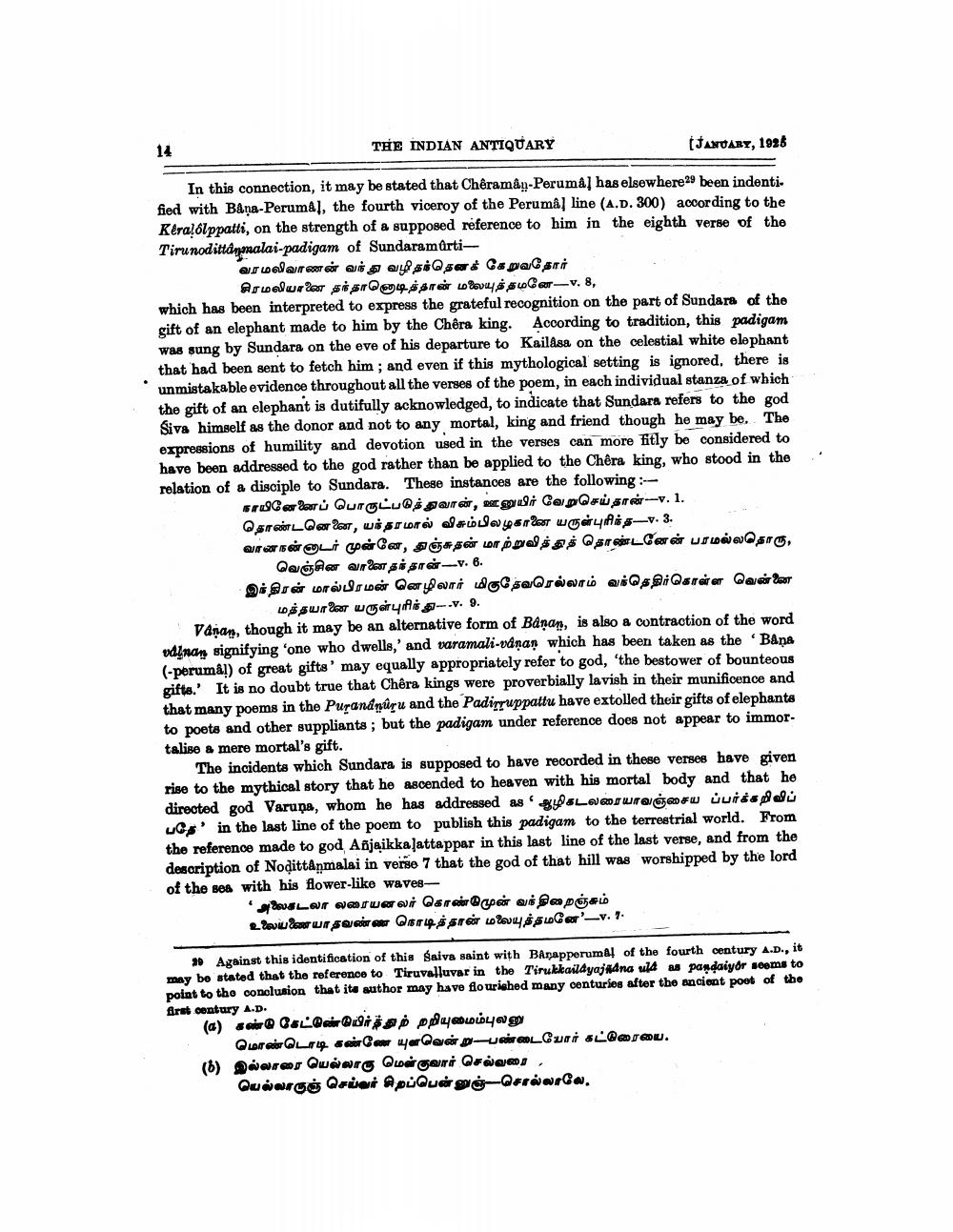________________
THE INDIAN ANTIQUARY
(Juron, 1925
-
-
In this connection, it may be stated that Chéram&g-Perumal haselsewhere29 been indentis fied with Bana-PerumA), the fourth viceroy of the Perumal line (A.D. 300) according to the Kera!lppatti, on the strength of a supposed reference to him in the eighth verse of the Tirunodittomalai-padigam of Sundaramürti
வாமலிவாணன் வந்து வழிதந்தெனக் கேறுவதோர்
சிரமலியானை தந்தானொடித்தான் மலையுத்தமனே-v. 8, which has been interpreted to express the grateful recognition on the part of Sundara of the gift of an elephant made to him by the Chêra king. According to tradition, this padigam was sung by Sundara on the eve of his departure to Kailasa on the celestial white elephant that had been sent to fetch him; and even if this mythological setting is ignored, there is unmistakable evidence throughout all the verses of the poem, in each individual stanza of which the gift of an elephant is dutifully acknowledged, to indicate that Sundara refers to the god Siva himself as the donor and not to any mortal, king and friend though he may be. The expressions of humility and devotion used in the verses can more fitly be considered to have been addressed to the god rather than be applied to the Chêra king, who stood in the relation of a disciple to Sundara. These instances are the following:
காயினேனைப் பொருட்படுத்துவான், ஊனுயிர் வேறுசெய்தான்-v. 1, தொண்டனெனை, யந்தரமால் விசும்பிலழகானை யருள்புரிந்த-v. 3. வான நன்னாடர் முன்னே, துஞ்சுதன் மாற்றுவித்துத் தொண்டனேன் பரமல்லதொரு,
வெஞ்சின வானை தந்தான்-v. 6. இந்திரன் மால்பிரமன் னெழிலார் மிகுதேவரெல்லாம் வந்தெதிர்கொள்ள வென்னை
மத்தயானை யருள்புரிந்து-.V. 9. Vanan, though it may be an alternative form of Banan, is also a contraction of the word vdinay signifying 'one who dwells,' and varamali-vanan which has been taken as the ‘ Bana (-perumal) of great gifts' may equally appropriately refer to god, "the bestower of bounteous gifts. It is no doubt true that Chêra kings were proverbially lavish in their munificence and that many poems in the Purandnúru and the Padirruppattu have extolled their gifts of elephants to poets and other suppliants; but the padigam under reference does not appear to immortalise a mere mortal's gift.
The incidents which Sundara is supposed to have recorded in these verses have given rise to the mythical story that he ascended to heaven with his mortal body and that he directed god Varapa, whom he has addressed as ' ஆழிகடலரையாவஞ்சைய ப்பர்க்க றிவிப் us' in the last line of the poem to publish this padigam to the terrestrial world. From the reference made to god Anjaikkalattappar in this last line of the last verse, and from the description of Noạittanmalai in verse 7 that the god of that hill was worshipped by the lord of the ses with his flower-like waves
' அலைகடலா லரையனலர் கொண்டுமுன் வந்திறைஞ்சும் உலையணையாதவண்ண நொடித்தான் மலையுத்தமனே'-V. I•
30 Against this identification of this gaiva saint with BAnapperumal of the fourth century A.D., it may be stated that the reference to Tiruvalluvar in the Tirukkaildyajana uld as pandaiyor seems to point to the conolusion that its author may have flourished many centuries after the ancient poot of the Grat.contury AD. (s) 'சண்டு கேட்டுண்டுயிர்த்துற் றறியுமைம்புலனு
மொண்டொடி கண்ணே யுளவென்று-பண்டையோர் கட்டுரையை. (6) இல்லாரை யெல்லாரு மெள்குவார் செல்வரைட,
யெல்லாருஞ் செய்வர் சிறப்பென்னுஞ் சொல்லாலே.




